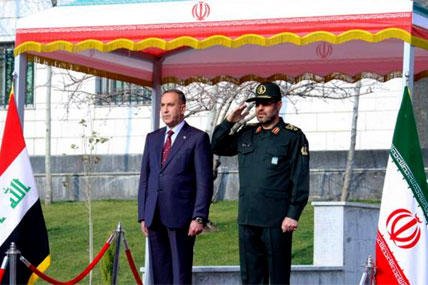Iran and Iraq have signed an agreement for Iran to train, advise and assist Iraqi forces similar to the deal Washington has with Baghdad in the fight against ISIS.
"We assume Iran's increased support for the Iraqi armed forces as a strategic necessity," Iraqi Defense Minister Khalid al-Obeidi said earlier this week after concluding the agreement in Tehran with Iranian Defense Minister Brig. Gen. Hossein Dehqan, the state-run Iranian Fars New Agency said.
At a news conference with Dehgan, Obeidi said "we do not see any other option than cooperation and being on the same side (with Iran) to uproot the terrorists," Fars said.
The announcement came amid growing Pentagon concerns over the separate efforts by Washington and Tehran to support the Baghdad government of new Prime Minister Haider al-Abadi.
In early December, the Pentagon warned Iraq of the potential threat to the U.S. air campaign against the militants affiliated with the Islamic State in Iraq and Syria, or ISIS, following reports that Iranian F-4 Phantom jets, which were sold to Tehran by the U.S. prior to the 1979 Iranian revolution, had bombed ISIS targets in northeastern Iraq.
"We have indications that they did indeed fly air strikes with F-4 Phantoms in the past several days," Navy Rear Adm. John Kirby, the Pentagon press secretary, said at a Dec. 2 briefing.
"We are flying missions over Iraq, we coordinate with the Iraqi government as we conduct those. It's up to the Iraqi government to de-conflict that airspace," he said.
A senior Iranian official later denied to Reuters that Iranian warplanes had conducted any airstrikes in Iraq.
The senior official, speaking on grounds of anonymity, said that "Iran has never been involved in any air strikes against the Daesh (ISIS) targets in Iraq. Any cooperation in such strikes with America is also out of question for Iran."
The announcement of the Iran-Iraq military agreement came as the U.S. prepared to bolster its own train, advise and assist mission in Iraq of about 1,500 troops with an additional 1,300 troops who were expected to begin arriving later this month. About 1,000 of the additional troops will come from the Army's 82nd Airborne Division.
The White House and the Pentagon have repeatedly expressed concerns that the growing involvement of Shiite Iran in Iraq will undermine efforts to promote Sunni-Shia unity in Iraq and derail plans to organize a National Guard among the Sunni tribes of western Iraq.
However, there was growing evidence of Iranian influence and the involvement of Iran's Revolutionary Guards directly in the fight against ISIS.
The visit of the Iraqi defense minister to Tehran coincided with the highly-publicized funeral in Tehran of Brig. Gen. Hamid Taqavi, a top Revolutionary Guards commander who was killed last month in Samarra north of Baghdad on the front lines against ISIS.
Taqavi was "martyred while performing his advisory mission" in Samarra for the Iraqi national security forces, the Fars news agency said.
The deal with Iran came as the Iraqi government also announced that violence and civilian deaths spiked in 2014 with the invasion of ISIS fighters that began last June and took over large swaths of territory in western and northern Iraq.
The Baghdad government said that more than 15,000 civilians and security personnel were killed in 2014, more than double the total of more than 6,500 in 2013.
Separately, the United Nations put the number of Iraqi civilians killed in 2014 at 12,282. "Yet again, the Iraqi ordinary citizen continues to suffer," said Nickolay Mladenov, the UN envoy in Iraq. "This is a very sad state of affairs."
-- Richard Sisk can be reached at richard.sisk@military.com




























